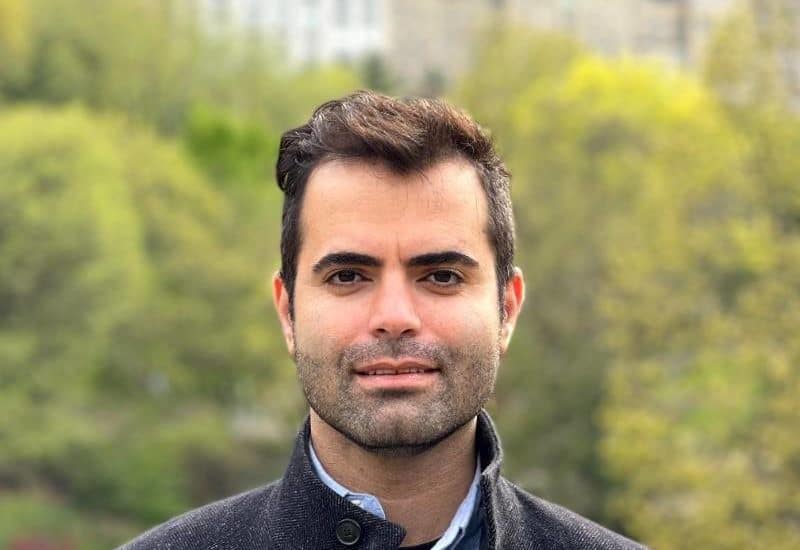Expert Spotlight: Nima Rad – Adding AI To The Toolbox To Boost Efficiency
- July 5, 2024
- Posted by: Dr Vinati Kamani
- Category: Healthcare App Development

Nima Rad, CTO and founding team member of a fast-growing, series A startup talks about how AI is already transforming how we approach healthcare challenges, building an innovation culture in HealthTech and more. Connect with him on LinkedIn here.
1. How do you see the role of technology evolving in patient care over the next decade?
I anticipate technology will increasingly empower patients to participate actively in their health journey. We’ll see a shift from reactive care to proactive, preventive approaches. This will be driven by advanced wearables, remote monitoring, and AI-powered tools that offer personalized insights and interventions.
Wearable devices like the Apple Watch are already tracking vital signs and providing real-time data to patients and healthcare providers, enabling early detection of potential health issues. We can expect these devices to become even more sophisticated, incorporating features like continuous glucose monitoring for diabetics and advanced heart monitoring capabilities.
AI, a key player in this transformation, will be critical in analyzing this data to provide actionable health recommendations and alerts to patients and providers, ensuring timely interventions and better health outcomes.
2. Which emerging technologies do you believe will have the greatest impact on healthcare in the near future?
I’m particularly excited about the convergence of AI and genomics. AI’s ability to analyze vast genomic datasets will revolutionize personalized medicine, allowing for tailored treatments and early disease detection. AI can identify genetic markers for diseases like cancer, enabling early and more accurate diagnosis and personalized treatment plans.
AR/VR technologies also hold immense potential for surgical training, patient education, and therapeutic applications. VR is being used to simulate complex surgeries, providing surgeons with realistic practice environments, enhancing their skills, and reducing the risk during actual procedures. AR can assist in real-time by overlaying critical information during surgeries, such as displaying vital statistics or highlighting critical anatomical structures, thus enhancing precision and safety in surgical procedures.
3. What role does/will artificial intelligence play in your current and future projects?
AI is already transforming how we approach healthcare challenges. For example, using AI to analyze radiology images improves diagnostic accuracy and speed, helping radiologists more efficiently identify conditions like tumors or fractures.
Additionally, AI predicts patient deterioration, allowing for timely interventions. Looking ahead, we see AI as a key enabler of precision medicine and a powerful tool for addressing population health needs, such as predicting disease outbreaks, identifying at-risk populations, and optimizing resource allocation to ensure that healthcare systems are prepared and responsive to emerging health threats.
4. Can you share an example of a major project or initiative in healthcare technology that inspired you?
We were particularly inspired by DeepMind’s AlphaFold project, which has made significant advancements in predicting protein structures. This initiative has the potential to revolutionize drug discovery and development by providing insights into the molecular structure of proteins, which is crucial for understanding diseases and developing effective treatments.
Predicting protein structures accurately can accelerate the development of new medications and therapies, offering hope for conditions with limited treatment options. This project exemplifies the power of combining cutting-edge AI with deep scientific knowledge to achieve breakthroughs that can profoundly impact global health.
5. How do you foster a culture of innovation within your technology teams?
We believe innovation thrives in an environment that encourages experimentation and learning. We prioritize creating a safe space for my teams to share ideas, test new approaches, and learn from successes and failures. We regularly revisit our toolbox and add more AI tools that bring efficiency, hold thinking workshops, and cross-functional collaborations to spark creativity and drive innovation.
Many aspects of the business have had a huge impact with AI, including development tools, code reviews, ideation, and product specification. AI handles Customer service services by tapping into our knowledge base and answering customers’ questions.
Sales teams benefit from AI-generated action items and summaries from their calls, allowing them to focus on building relationships and closing deals. By fostering a culture that values continuous learning and innovation, we can stay ahead of the curve and drive meaningful advancements in healthcare technology.
6. What are the key skills and qualities you believe are essential for a successful CTO in the healthcare tech sector?
A successful CTO needs a unique blend of skills. Deep technical expertise is crucial, but a profound understanding of systems, regulatory landscapes, and customer needs is equally important. Strong leadership, communication, and building strategic partnerships are essential for navigating complex ecosystems.
Additionally, a successful CTO must translate complex technical concepts into actionable strategies and communicate effectively with technical and non-technical stakeholders. This requires a combination of technical acumen, business savvy, and the ability to inspire and lead diverse teams toward a common vision of improving patient care through technology.
Nima Rad is the co-founder and CTO of a rapidly growing enterprise, SaaS series A startup building an AI resource management platform. With over a decade of experience in software engineering and development, Nima has led teams to design and implement scalable and innovative software solutions. Previously, he held key engineering roles at Great Jones, Mark43 Inc., and Microsoft.
